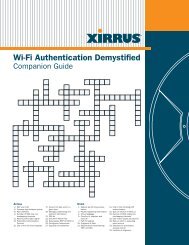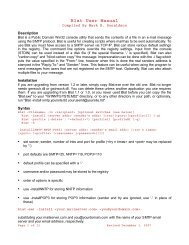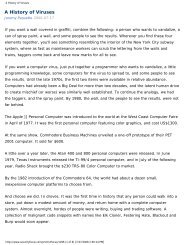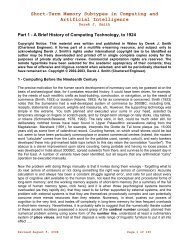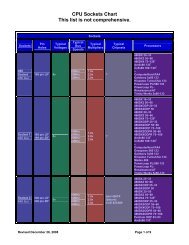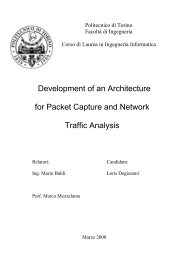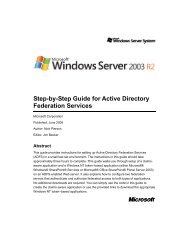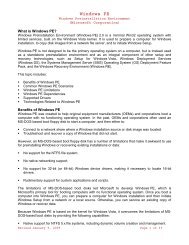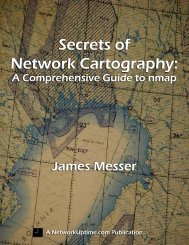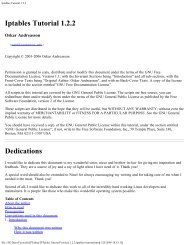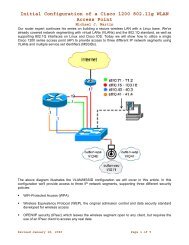SCO UnixWare 2.1 Technical Summary - Bandwidthco Computer ...
SCO UnixWare 2.1 Technical Summary - Bandwidthco Computer ...
SCO UnixWare 2.1 Technical Summary - Bandwidthco Computer ...
You also want an ePaper? Increase the reach of your titles
YUMPU automatically turns print PDFs into web optimized ePapers that Google loves.
An <strong>SCO</strong> <strong>Technical</strong> White Paper Version <strong>2.1</strong>.2<br />
Members of the Internet protocol family in <strong>SCO</strong> <strong>UnixWare</strong> <strong>2.1</strong> are:<br />
Internet Protocol (IP) standard Internet datagram delivery<br />
protocol and addressing method<br />
Transmission Control Protocol (TCP) standard Internet connection-oriented<br />
protocol. Provides reliable, flow controlled,<br />
in-order two-way transmission of data<br />
User Datagram Protocol (UDP) high-speed, connectionless datagram<br />
protocol<br />
Address Resolution Protocol (ARP) maps IP addresses to Ethernet addresses<br />
Reverse Address Resolution Protocol (RARP) maps Ethernet addresses to IP addresses<br />
Internet Control Message Protocol (ICMP) used to report status and errors in IP<br />
communication<br />
File Transfer Protocol (FTP, TFTP) standard Internet protocol for uploading and<br />
downloading files<br />
Routing Information Protocol (RIP),<br />
standard Internet routing protocols<br />
Exterior Gateway Protocol (EGP)<br />
Bootstrap Protocol (BOOTP) protocol that allows multiple systems to<br />
have IP addresses dynamically assigned by<br />
a BOOTP server.<br />
HyperText Transfer Protocol (HTTP) the core data-transport protocol for the<br />
World Wide Web<br />
Network News Transport Protocol(NNTP) the building block of the Usenet news<br />
Serial Line IP (SLIP),<br />
Point-to-Point Protocol (PPP)<br />
Internet Application Services<br />
20<br />
system on the Internet<br />
standard point-to-point protocols for<br />
delivering IP over serial links<br />
The TCP/IP protocols are used by Internet applications, the X Windows System and the NFS<br />
distributed file system. The Internet applications supported on the <strong>SCO</strong> <strong>UnixWare</strong> system<br />
include:<br />
• ARPA utilities:telnet, ftp<br />
• Berkeley r* utilities: rlogin, rcp, rsh, rwho, ruptime, rdist, finger<br />
• Berkeley lpd printer daemon<br />
• Router programs: route, routed, gated<br />
• BIND domain name service (DNS)<br />
• Berkeley sendmail<br />
• Simple Mail Transfer Protocol (SMTP)<br />
• BNU/UUCP<br />
• Remote execution facility (REXEC)<br />
• Simple Network Management Protocol (SNMP) with SMUX extensions<br />
• HyperText Markup Language(HTML)<br />
Internet API Services<br />
With the <strong>SCO</strong> <strong>UnixWare</strong> <strong>2.1</strong>.2 Upgrade, developers have access to key Internet API services for<br />
new web-enabled applications and integrating applications developed with other languages and<br />
databases into the web server. As is the case with client-side integration, both platformindependent<br />
and platform-native code can be integrated. The server programming mechanisms<br />
fall into three different groups:<br />
• CGI (Common Gateway Interface) is the Internet standard interface for invoking serverbased<br />
scripts or compiled programs. It is the most prevalent means of providing dynamic



